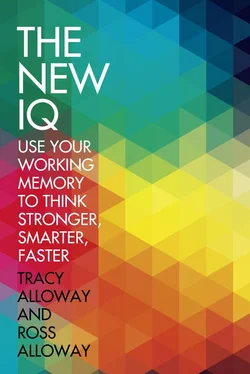Let’s say you’re finishing up your secondary education, and you aspire to an Oxbridge college. You may have high marks, but you still have to perform in your A-levels. If you study diligently, you can get the grades you need and stand a good chance of gaining entry to an elite institution. Working memory helps you keep your goal in mind and gives you the motivation you need to put your nose to the grindstone even when your friends are heading out to a party and invite you to join them. Working memory helps you say no.
Stay Positive in the Midst of a Dire Situation
Your Conductor is wired to organize emotions into those that are relevant and those that are not. The Conductor interprets signals from the amygdala, the primitive emotional heart of the brain that generates feelings of fear and anxiety, and then modulates those emotions to help us concentrate on positive thoughts. Later, we’ll show you how this played out when Mario Sepulveda, one of the thirty men rescued from a collapsed Chilean coal mine in 2010, used humor to keep the group from devolving into chaos. Even during the gloomiest days underground, Mario was able to stay upbeat by focusing on the future.
Follow Your Moral Compass
Working memory helps you do the right thing in business, in social interactions, and even in your romantic relationships. It can help you stay faithful while others stray. Research shows that a good working memory gives you romantic self-control. People with a robust working memory manage to keep their relationship goals in mind and act to protect their relationship when something threatens it—like when an attractive coworker comes on to you during a business trip. Conversely, people with poor working memory are more vulnerable to giving in if an opportunity to stray presents itself.
There are times when a powerful working memory can be your best teammate. Let’s say you’re a tennis player. When the tennis ball comes bouncing to your side of the net, what shot do you make? Forehand cross-court, backhand down the line, lob, drop shot? Working memory helps you sift through the options and choose the best one, all while keeping in mind your opponent’s position on the court. The more quickly your working memory can process all this information, the more likely you are to execute the shot well.
The Most Important Learning Tool: The New IQ
Our society has relied on IQ as the go-to measure of intellectual capability for nearly a century. The common belief is that the higher your IQ, the better your advantage in whatever you do. But a high IQ doesn’t necessarily mean you will get what you want in life. On the other hand, how do some people with below-average IQ scores rise to the top to become business bigwigs, bestselling authors, or innovative inventors? What if we told you that IQ isn’t the best measure of intelligence or the best predictor of lifetime success, especially not in the twenty-first century?
The modern IQ test has its roots in the early twentieth century. In 1917, as World War I raged on, the U.S. Army enlisted Richard Yerkes, the distinguished president of the American Psychological Association, to create a test to measure the intelligence of nearly 3 million army recruits. The army wanted to determine which men should be officers and which should be relegated to the lower ranks. Yerkes designed a test that measured the recruits’ knowledge of facts and vocabulary, also known as crystallized knowledge.
But during wartime when nothing goes according to plan and you have to adapt to enemy tactics or lose, knowing concrete facts—say, that Rutherford B. Hayes was elected president in 1876 or that Bismarck is the capital of North Dakota—isn’t really helpful. Many of the men tagged for high-ranking positions failed miserably, while some men who languished in the lower ranks proved to have excellent military minds. The army quickly realized that Yerkes’s test was identifying the wrong men for the job and abandoned it after six months. But the rest of society has continued to measure intelligence based on the amount of crystallized knowledge you have, and the modern IQ test doesn’t look all that different from Yerkes’s test. That’s a big problem.
Thanks to Google and similar search engines, the world has undergone profound transformation in how we seek out, weed out, and absorb information. We live in the Google age. In cognitive terms, Google is great. It has considerably reduced the amount of intellectual resources that we previously had to dedicate to rooting out facts before we could do something with them. Because of Google, we no longer need to rely so much on crystallized knowledge—the memorization of facts, dates, or names—associated with IQ and the traditional concept of intelligence. With nothing more than a few clicks, we can pull up just about any information we need. But the key to intelligence today is being able to put those facts together, prioritize the information, and do something constructive with it. And there is one skill that gives you the advantage of managing all this information: working memory. IQ is what you know. Working memory is what you can do with what you know.
In one of her earliest research projects, Tracy compared students’ grades with their IQ and working memory scores. She found that working memory could predict what grade they would get with far greater accuracy than IQ. In fact, if Tracy knew a child’s working memory, she could determine his or her grades with 95 percent accuracy. In Chapter 5we will go into much greater detail about this study and other research showing that working memory gives you more of an advantage in the classroom than IQ. Here are just a few of the many fascinating and sometimes surprising findings we will explore in that chapter:
A good working memory is the best advantage in school and is causally related to grades.
Kids with good IQ scores don’t necessarily have a good working memory.
An average or even a high IQ doesn’t necessarily give the student the tools for success in the classroom and beyond.
IQ is linked to how rich or poor you are, but working memory isn’t, which makes it a great equalizer.
The research on working memory also shows that the strength of a person’s working memory influences far more than grades. An abundance of new evidence, which we present in this book, shows that the strength of your working memory plays a pivotal role in how successful you will be in many areas of your life, including whether you’ll have the fortitude to work toward your long-term goals, whether you view the glass as half-full or half-empty, and even whether you’ll be able to lay off the junk food when dieting.
How Working Memory Is Undermined
Unfortunately, many things in our fast-paced 24/7 society are working against us to weaken our working memory. And when working memory isn’t operating at full speed, it puts us at a big disadvantage.
If your working memory isn’t up to snuff, you could drown in the overwhelming flood of data. Todd learned about the impact of information overload the hard way. As a serial entrepreneur, the thirty-five-year-old father of three was no stranger to the frenetic pace of a Silicon Valley high-tech start-up company. He spent every day sitting in front of four computer screens that beeped and pinged and flashed email alerts, instant messages, websites, and Twitter feeds. His clients constantly called his home office, his kids demanded attention, and he was inseparable from his iPhone as he toggled between his home and office life. For more than a year, Todd had been looking for a buyer for his company. But when a large company based on the East Coast emailed Todd saying that they were interested in acquiring his firm, the email got lost in the chaos of his life and he didn’t discover it in his email inbox for over a week. If he hadn’t finally stumbled across it when scanning back through his correspondence one evening at home, he might have lost what turned into a $2-million-dollar sale.
Читать дальше












